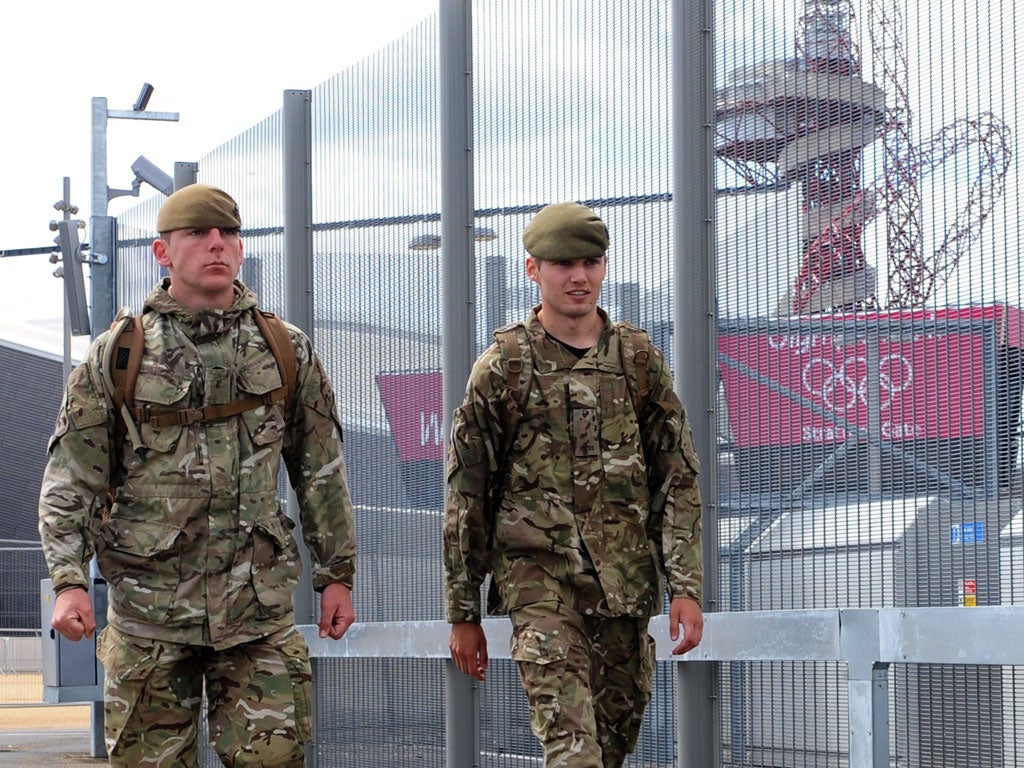They left Olympics high and dry – but G4S will not pay penalty
Government confirms no penalty clause in security firm's contract, despite Theresa May's assertions

Private security company G4S will not be financially penalised for failing to recruit sufficient security guards for the Olympic Games, it emerged last night.
The firm has been accused of letting the country down just two weeks before the Games, with soldiers forced to cancel family holidays to ensure venues are protected. But a senior Government source told The Independent that the contract with G4S did not include a penalty clause.
The revelation appears to contradict a statement by the Home Secretary Theresa May in the House of Commons. She told MPs that while the contract was between G4S and the Games organisers Locog, she understood that there were "penalties within that contract".
A source said that in fact it was a pro-rata agreement where G4S were paid for each extra security guard they supplied – and not penalised if they did not make the overall target. "The person who negotiated the contract should be shot," the source said.
It is also understood that the Ministry of Defence – who only found out about the troop request on Monday – have demanded that all the additional cost is borne by the Home Office.
Last night it was also claimed that G4S's recruitment problems may have been exacerbated by the Home Office's delays in vetting candidates.
Theresa May yesterday told the Commons that she was only told that the firm could not honour its contract on Wednesday, although ministers had been aware that extra troops might be needed for a couple of weeks.
A spokesperson for Locog, which negotiated the £284m contract with G4S, said: "If G4S are not providing the same number of staff as they were before, they will not be being paid the same amount of money."
Senior armed forces officers are concerned that the extra demands on troops will have a damaging effect on morale. Some will be forced to cancel family holidays while others have recently returned from deployment and will be going almost directly into checking bags at Olympic venues.
Some of the troops put on Olympic duty have just received redundancy notices, including members of the Argyll and Sutherland Highlanders.
Some will have to be brought back from postings abroad, including in Canada. A camp is likely to be set up to house them in north east London. All this, and compensating those who lose their holidays, will add to the cost.
Meanwhile people who had applied for G4S's more than 10,000 Olympic security jobs emerged to complain about the company. Some said they had been sent security passes to access Olympic venues before training, whilst others said they had been given the job without any sessions at all.
Regardless of any potential financial cost to the company, the embarrassment for such a major player in the security business will be severe. G4S, formed in 2004 by a merger of Group 4, Falck and Securicor, manages six prisons, three secure training centres and two immigration centres in the UK – and it has a world profile to think about too, with 657,000 employees across the globe and an annual revenue of £7.5bn stemming from work in more than 125 countries.
The Labour MP Margaret Hodge who chairs the Public Accounts Committee which has attempted to scrutinise the Olympics' ever-rising security budget, told the Independent: “We shall have the Home Office back in September and we shall get to the bottom of that contract. The Home Office Permanent Secretary and the Locog Chief Executive were absolutely clear to us when they increased that contract that they were confident G4S could deliver. We asked them, 'How can you double or nearly triple the numbers at this late stage and expect them to deliver?' But they told us they were confident they would.”
According to documents shown to the Public Accounts Committee, of the £284m, £125m constitutes G4S's "program management" and "operational costs", which rose from around £10m when the contract was renegotiated. "We will not be getting any of that par back," Ms Hodge claimed.
A spokesperson for G4S said: "We have encountered some delays in progressing applicants through the final stages but we are working extremely hard to process these as swiftly as possible."
Profile: So who are G4S?
* Formed by merger of Group 4, Falck and Securicor in 2004.
* Operates in more than 125 countries with 657,000 employees.
* Annual revenue of £7.5bn.
* Provides security services at 14 UK airports and four ports.
* Manages six UK prisons, three secure training centres, and two immigration centres.
* Current chief executive is Nick Buckles, the Essex-born son of a dinner lady.
Surrey Police pull out of £1.5bn contract
Surrey Police has withdrawn from Britain's biggest privatisation contract. Some of the candidates for the job of the force's police and crime commissioner actively campaigned against it, citing G4S as a factor. G4S is on a shortlist of six groups bidding for the £1.5bn "business partnership programme" with West Midlands Police, under which private companies would take over a wide range of policing functions including detaining suspects.
Join our commenting forum
Join thought-provoking conversations, follow other Independent readers and see their replies
Comments
Bookmark popover
Removed from bookmarks